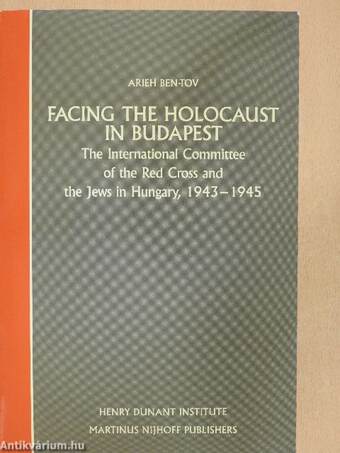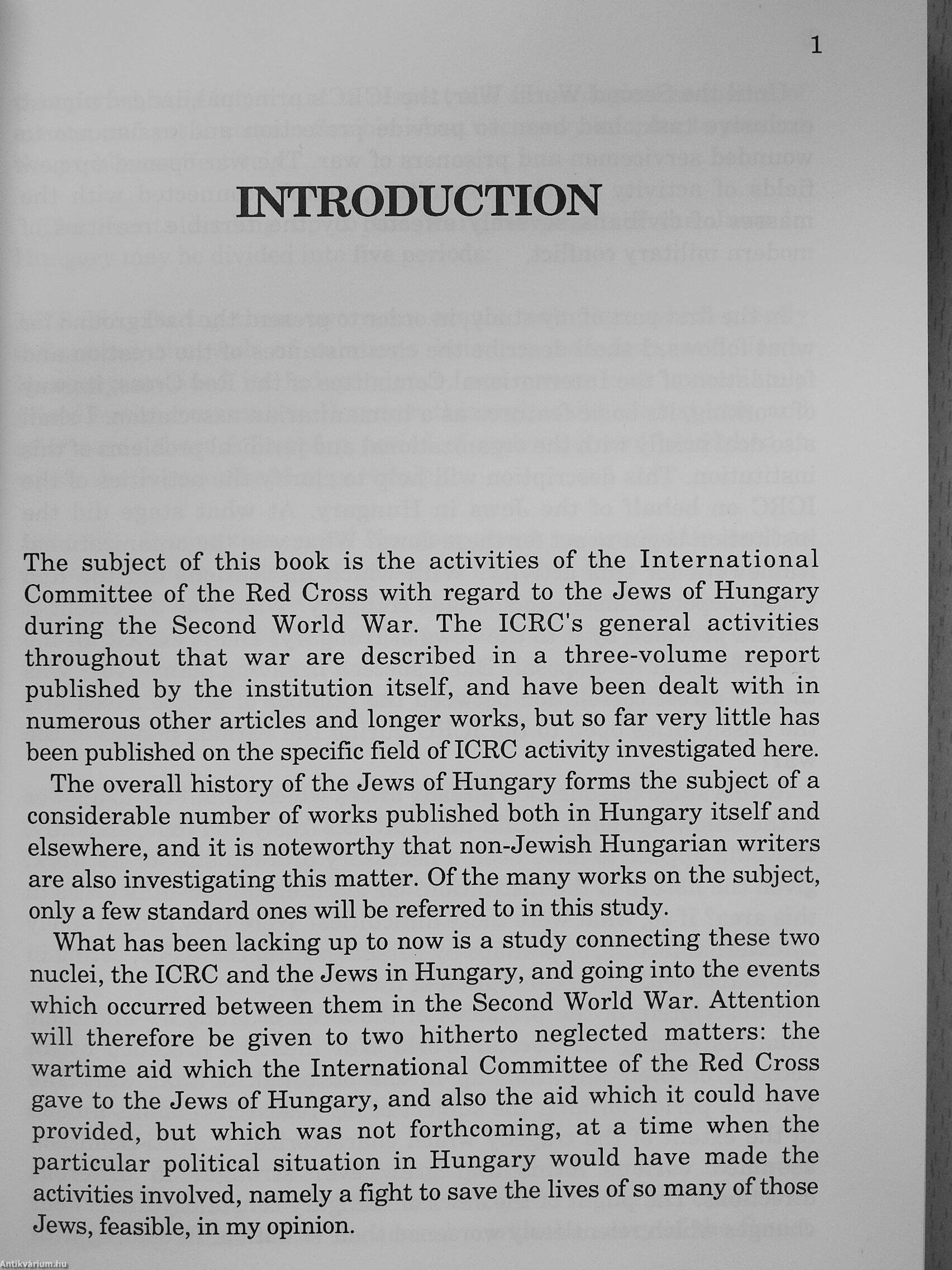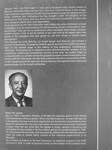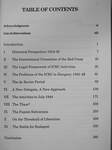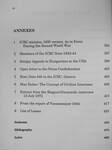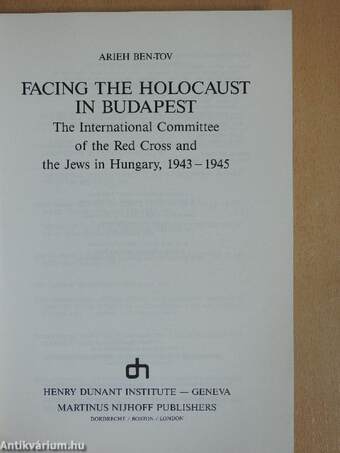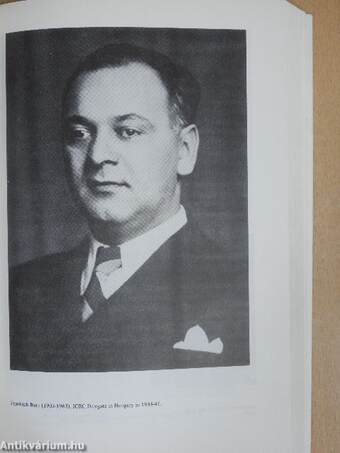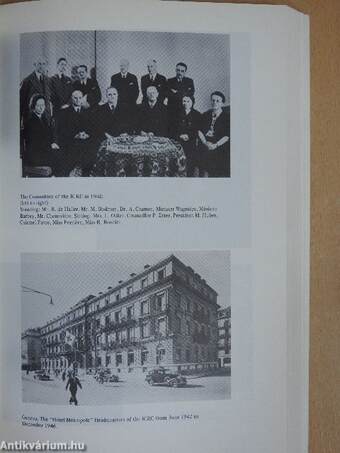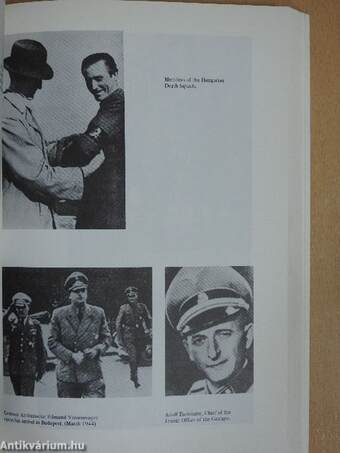1.067.053
kiadvánnyal nyújtjuk Magyarország legnagyobb antikvár könyv-kínálatát

VISSZA
A TETEJÉRE
JAVASLATOKÉszre-
vételek
Facing the Holocaust in Budapest (dedikált példány)
The International Committee of the Red Cross and the Jews in Hungary, 1943-1945
| Kiadó: | Martinus Nijhoff Publishers |
|---|---|
| Kiadás helye: | Hága |
| Kiadás éve: | |
| Kötés típusa: | Ragasztott papírkötés |
| Oldalszám: | 491 oldal |
| Sorozatcím: | |
| Kötetszám: | |
| Nyelv: | Angol |
| Méret: | 24 cm x 16 cm |
| ISBN: | 90-247-3764-8 |
| Megjegyzés: | Arieh Ben-Tov szerző által dedikált példány. Fekete-fehér fotókkal, rajzokkal illusztrálva. |
naponta értesítjük a beérkező friss
kiadványokról
naponta értesítjük a beérkező friss
kiadványokról
Előszó
TovábbFülszöveg
January 1945. The Wehrmacht is evacuating Budapest after several weeks of fighting. Amid the chaos and the ruins, one man, Friedrich Bom, is still struggling to maintain a semblance of authority and protection over the network of buildings, hospitals and institutions he has brought under the emblem of the International Red Cross, and into which are crammed thousands of Jews who have escaped persecution and deportation.
What was done by the Red Cross after that ill-fated day when Eichmann arrived in Hungary, bent on exterminating the last surviving Jewish community in Central Europe? How are we to understand what motivated these Swiss citizens, whose mission it was to aid all victims of war, and who at all stages were fully aware of the slaughter that was going on, yet who chose to remain silent throughout?
This account by Arieh Ben-Tov, an Israeli lawyer and historian and himself a survivor of Auschwitz, is based on hitherto secret records of the ICRC and sheds light on the... Tovább
Fülszöveg
January 1945. The Wehrmacht is evacuating Budapest after several weeks of fighting. Amid the chaos and the ruins, one man, Friedrich Bom, is still struggling to maintain a semblance of authority and protection over the network of buildings, hospitals and institutions he has brought under the emblem of the International Red Cross, and into which are crammed thousands of Jews who have escaped persecution and deportation.
What was done by the Red Cross after that ill-fated day when Eichmann arrived in Hungary, bent on exterminating the last surviving Jewish community in Central Europe? How are we to understand what motivated these Swiss citizens, whose mission it was to aid all victims of war, and who at all stages were fully aware of the slaughter that was going on, yet who chose to remain silent throughout?
This account by Arieh Ben-Tov, an Israeli lawyer and historian and himself a survivor of Auschwitz, is based on hitherto secret records of the ICRC and sheds light on the darkest page in the history of that prestigious humanitarian institution. Proceeding by a meticulous and well-documented analysis of the motivations underlying humanitarian activity at the time, the author helps us comprehend the incredible inertia that gripped Europe's moral forces when confronted with the Holocaust. He also does justice to the drive and audacity of those who fought against all odds and whose memory has recently been honoured posthumously by the Israeli authorities.
About the author
Born in 1923 in Bendzin, Poland, Arieh Ben-Tov became active in the Zionist Youth Movement while at school. When the War broke out, he was first interned in the ghetto of his town and then deported to the Auschwitz concentration camp where he remained for one and a half years. He was the only survivor of a family of eight. After the war Arieh Ben-Tov settled in Israel, served in the army and completed his law studies in Tel Aviv before going into private practice in 1957. He volunteered his services, and successfully settled with the German government the case of Jewish twins, victims of the infamous experiments of Dr Mengele.
As a student of history at Tel Aviv University, he obtained access to the ICRC archives in 1979, in order to pursue a study on the subject of the present book. Vissza
Témakörök
- Idegennyelv > Idegennyelvű könyvek > Angol > Orvostudomány
- Idegennyelv > Idegennyelvű könyvek > Angol > Helytörténet
- Idegennyelv > Idegennyelvű könyvek > Angol > Történelem > Európa története > Magyarország története
- Helytörténet > Magyarország > Városok > Budapest
- Orvostudomány > Általános orvosi, egyéb > Egészségügy > Intézmények > Vöröskereszt
- Orvostudomány > Általános orvosi, egyéb > Idegennyelvű
- Orvostudomány > Általános orvosi, egyéb > Orvostudomány története
- Orvostudomány > Orvosi idegennyelvű könyvek > Általános orvosi
- Történelem > Idegennyelvű > Angol
- Történelem > Politika > Külpolitika > Diplomácia
- Történelem > Magyarország története és személyiségei > Magyarország a XX. században > II. világháború > Holokauszt
- Történelem > Legújabb kor > II. világháború > Holokauszt
- Dedikált, aláírt kiadványok > Helytörténet > Szerző által > Dedikált kötetek
- Dedikált, aláírt kiadványok > Idegennyelv > Szerző által > Dedikált kötetek
- Dedikált, aláírt kiadványok > Orvostudomány > Szerző által > Dedikált kötetek
- Dedikált, aláírt kiadványok > Történelem > Magyar történelem > Szerző által > Dedikált kötetek
- Helytörténet > Dedikált, aláírt kötetek > Szerző által > Dedikált kötetek
- Idegennyelv > Dedikált, aláírt kötetek > Szerző által > Dedikált kötetek
- Orvostudomány > Dedikált, aláírt kötetek > Szerző által > Dedikált kötetek
- Történelem > Dedikált, aláírt kötetek > Szerző által > Dedikált kötetek
Arieh Ben-Tov
Arieh Ben-Tov műveinek az Antikvarium.hu-n kapható vagy előjegyezhető listáját itt tekintheti meg: Arieh Ben-Tov könyvek, művekMegvásárolható példányok
Nincs megvásárolható példány
A könyv összes megrendelhető példánya elfogyott. Ha kívánja, előjegyezheti a könyvet, és amint a könyv egy újabb példánya elérhető lesz, értesítjük.



